
Woodland Park Zoo in Seattle, WA is located just 10 minutes north of Seattle’s downtown in the Phinney Ridge neighborhood. The zoo’s 92-acres and award-winning exhibits are home to more than 1,000 animals representing 300 species from around the world. Woodland Park Zoo’s acres are divided into bioclimatic zones, featuring different natural habitats ranging from humid tropical rain forests and coastal deserts to temperate rain forests like those of the Pacific Northwest. Woodland Park Zoo welcomes more than one million annual visitors to explore the natural world, inspiring conservation at home and around the planet. You’ll never experience the same zoo twice, so come see what’s new today!
 Summer Concerts at Woodland Park Zoo – B-52’s, Ziggy Marley, and More
Summer Concerts at Woodland Park Zoo – B-52’s, Ziggy Marley, and More
Woodland Park Zoo in Seattle, Washington is one of the top tourist attractions in the area. But even though many people know about this venue, it is safe to say that a lot pass it by time and time again. When it comes down to it, Woodland Park Zoo has quite a bit to offer! And get this- not only is it a great place to see animals and learn about wildlife, but Woodland Park Zoo also hosts many concerts year in and year out!
Woodland Park Zoo’s BECU ZooTunes presented by Carter Subaru is back for another season of outdoor concerts- a Seattle summer tradition celebrating more than 30 years. Enjoy live music performances from today’s top talent in rock, folk, soul and blues performing against one of Seattle’s most beautiful outdoor backdrops: Woodland Park Zoo’s picturesque North Meadow.
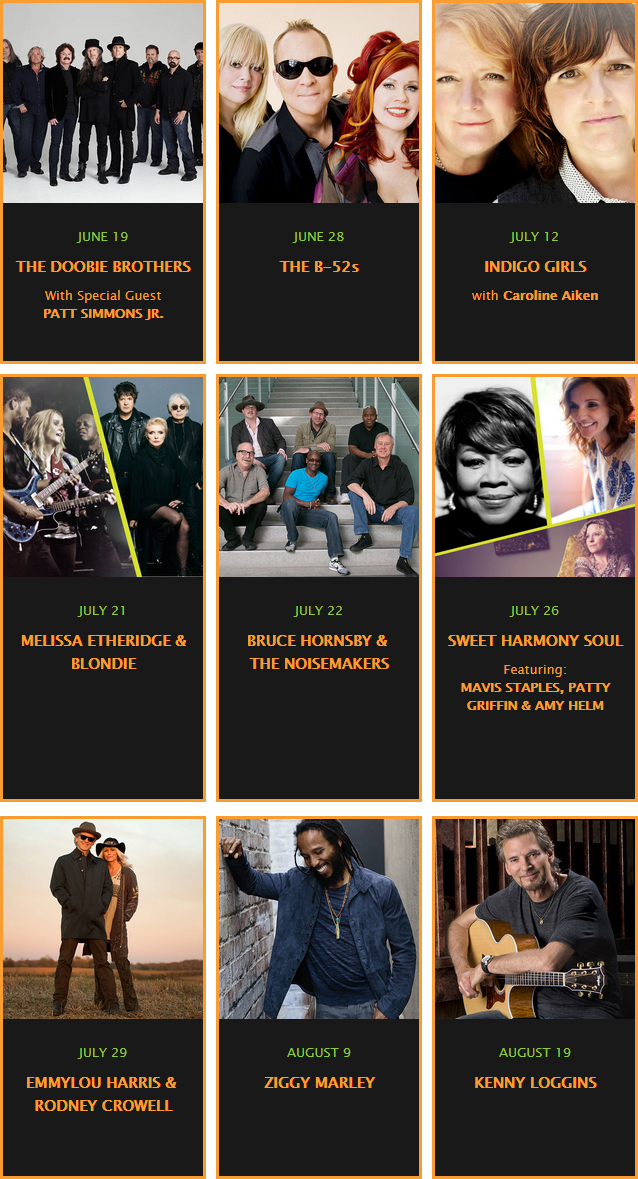 Upcoming ZooTunes Concerts at Woodland Park Zoo
Upcoming ZooTunes Concerts at Woodland Park Zoo
Tickets available at zootunes.ticketfly.com
Although the Woodland Park venue is not huge, it is big enough to accommodate the needs of the people who show up. Upcoming performers include Ziggy Marley, The Doobie Brothers, Herbie Hancock, the Indigo Girls, Pink Martini, Brandi Carlile, Bela Fleck and The Flecktones, and many more.
If a concert is not sold out, you may purchase tickets online or at the zoo’s West Entrance until approximately 8:00 p.m. Please keep in mind that most concerts end at approximately 8:30 p.m., so please check in advance to make sure there are still tickets available and get there early so you can enjoy the majority of the show.
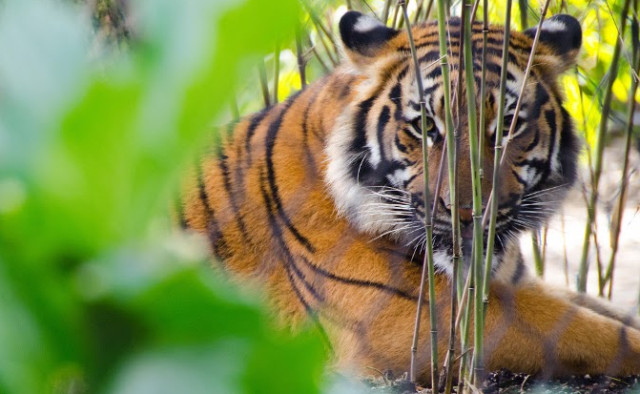 Woodland Park Zoo’s Latest Exhibit – Banyan Wilds
Woodland Park Zoo’s Latest Exhibit – Banyan Wilds
Banyan Wilds, the latest exhibit at Woodland Park Zoo, explores the diversity of Asia’s tropical forests and the crossroads we face as all of our needs come to a head. The forests of Asia teem with life: tigers slinking through grass to stalk prey, sloth bears slurping grubs from a log, great arguses pecking at the forest floor, Asian small-clawed otters diving for fish—and humans are there too. People share the forest: communities rely on forest resources, sometimes in harmony and sometimes in competition with wildlife. Discover how communities are learning to coexist with wildlife, and how our actions can make a difference all the way across the globe.
Historically tigers ranged throughout Asia from the Caspian region into Central Asia, most of South and Southeast Asia, and East Asia and Siberia. Today their dramatically reduced range is limited to 13 countries in scattered areas of the Indian sub-continent, Southeast Asia, Sumatra, China and the Russian Far East. The Malayan tiger is endemic to southern and central Malay Peninsula. This includes only peninsular Malaysia and its border area with the southern tip of Thailand.
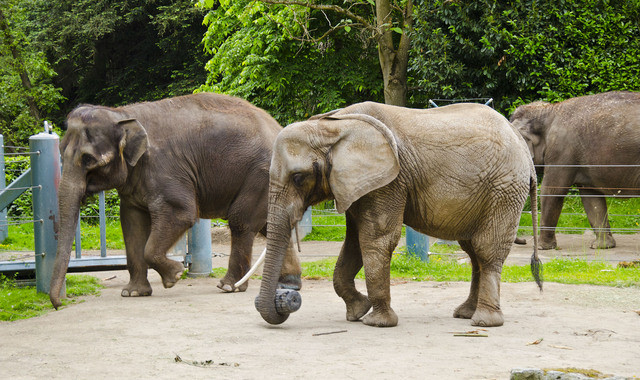 Asian Elephants at the Woodland Park Zoo
Asian Elephants at the Woodland Park Zoo
Also found in Asia are elephants. Asian and African elephants look much alike, but there are several physical characteristics that distinguish them from one another. Asian elephants are smaller in size, usually have smaller tusks (a female’s tusks are not visible beyond the lips), have two domed-shaped bulges on their forehead, have a rounded back, smaller ears and less wrinkled skin, and have a single finger-like projection at the top of the trunk tip. The Asian, or Indian, elephant belongs to the family Elephantidae, which also includes its larger relative, the African elephant.
Although a longtime fixture of the zoo, the elephants of Woodland Park have recently joined a new herd in Oklahoma. Woodland Park Zoo’s two female Asian elephants could be seen at the Elephant Forest exhibit located in the Tropical Asia bioclimatic zone. The elephants had use of a large area that includes a paddock, bathing pool and barn. It is expected that at some point in the near future, elephants will be running wild in Woodland Park Zoo once again.
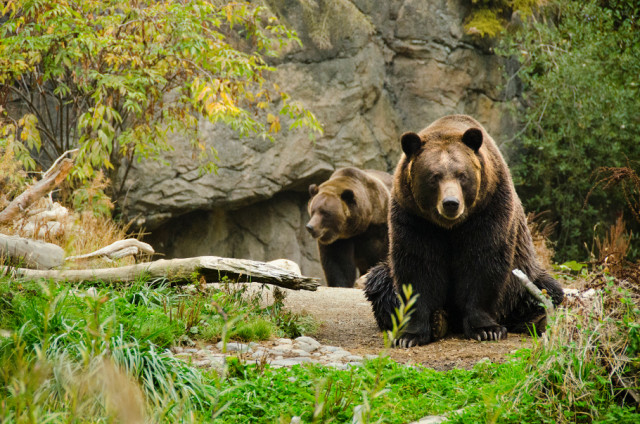 Grizzlies in their Natural Habitat at Woodland Park Zoo
Grizzlies in their Natural Habitat at Woodland Park Zoo
A bit more domestic to the US and especially the Pacific NW, Seattle’s Woodland Park Zoo also has bears! Brown bears have a head and body length of 68-112 inches, and their tail is 2.5-8.5 inches in length. Brown bears range from 209-1,716 pounds in weight. Adult males normally weigh more than adult females. Coastal Kodiak bears, which feed on high-calorie diet of salmon, can often reach 1,540 pounds. Brown bears residing in the interior primarily feed on lower calorie diet of berries, vegetation and small mammals. The weights of interior bears varies from about 330-794 pounds in Alaska and British Columbia, to 209-306 pounds in the Yukon Territory, to 224-714 pounds in Yellowstone National Park.
The zoo’s two brown bears are grizzly bears. They can be viewed from a number of locations within the Northern Trail. Several overlooks provide fantastic views of the bears ambling over ground and through streams. Two cave-like apertures offer a private view of the bears and their pool. Inside the Taiga Viewing Shelter, visitors can watch the bears swim in their pool and try to catch live trout. Woodland Park Zoo has kept brown bears for nearly 100 years. During this time, these bears have successfully raised 13 cubs.
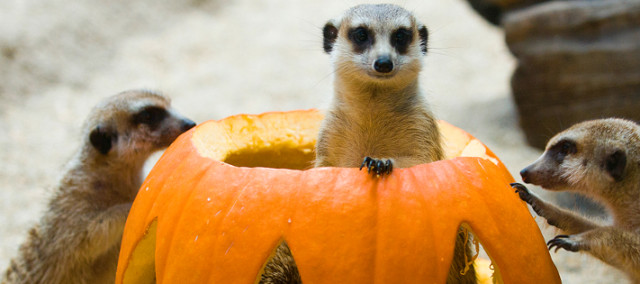 The Beloved Meerkats of Woodland Park Zoo
The Beloved Meerkats of Woodland Park Zoo
One of the new attractions (and new favorites!) at the Pacific NW’s Woodland Park are their Meerkats. The Meerkat belongs to the family Herpestidae or mongoose family. Meerkats dwell in the savannas and grasslands of South Africa, Namibia, Botswana and Angola.Meerkats live in the Kalahari Desert, which is not a true desert as it supports many plants and animals. Meerkats are carnivores, so they mostly stick to mostly meat. Temperatures reach over 100 degrees F in summer and drop down close to freezing in the winter. Meerkats are carnivores, so they mostly stick to mostly meat. Meerkats will use their claws to dig large underground burrows, but spend much of the day outside foraging, babysitting, grooming each other, or playing, with a sentry keeping an eye out for danger.
When you see animals at Woodland Park Zoo, you help save wildlife. That’s because a portion of every dollar you spend at Woodland Park Zoo supports animal conservation projects in the Northwest and around the world. The bounty of nature isn’t reserved to protected parks or wildlife TV specials. It’s connected to us every day in the air we breathe, the water we drink and the climate that shapes our food sources. We need nature, and nature needs us to take action.
Conserving animals is at the heart of the solution. It’s imperative to protect their diversity, abundances and the ecological services they provide by slowing the unnaturally high rates of species extinctions. Our own well-being is inextricably linked to the well-being of wildlife and wild places. The time to act is now, and Woodland Park Zoo in Seattle encourages you to do as they do- act.

Zoo.org
May 1 – September 30
Hours
Open 9:30 a.m. – 6:00 p.m. daily.
Zoomazium open until 5:30 p.m.
Zoo grounds open until 7:00 p.m.
Prices
Adult (13 – 64 years) – $19.95
Child (3-12 years) – $12.25
Toddler (0 – 2 years) – FREE
Senior (65+) and disabled discount – $2 off regular admission
October 1 – April 30
Hours
Open 9:30 a.m. – 4:00 p.m. daily.
Zoo grounds open until 5:00 p.m. No entry after 4:00 p.m. Indoor exhibits close at 4:00 p.m.
Prices
Adult (13 – 64 years) – $13.75
Child (3-12 years) – $9.25
Toddler (0 – 2 years) – FREE
Senior (65+) and disabled discount – $2 off regular admission








